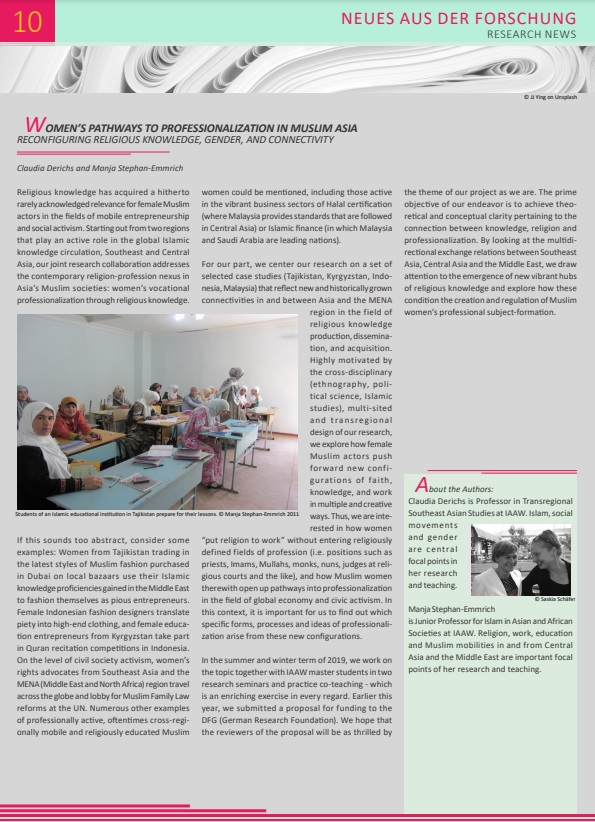Project Introduction
Defining the Female Muslim Professional
As part of the scholars in residency program to our project from 28th of June until 6th of July, we discussed in close collaboration with our international partners the question, what it means to be a Female Muslim Professional. We were looking at female Muslims in Asia and Middle East, active in profession, not just in reference to religious knowledge but also to their professional activities as Muslim fashion designers, traders, human rights activists, life coaches and health counselors with basic religious knowledge. The ultimate goal of the project during the program was to come up with a reconceptualization of the following notions:
- Religion & Knowledge: There is the importance of defining the term of religion as well as knowledge which would allow us to conceptualize religious knowledge for further publications.
- In Sociology a professional is defined as a lawyer or medical doctor. Is a housewife or an auto mechanic not a professional? How far can this working definition from Sociology be stretched? What is the self-understanding of Muslim women, who are active in jobs - activities that bring them money? There are Muslim women in the world with the notion that they need a certain religious knowledge to be successful in their field which includes religion or religious knowledge in the „professional “.
In the followed-up discussion we conversed that one notion does not exist without the other and that the entanglement of concepts needs to be looked at on a deeper lever. The project deals with the multiplicity of concepts which addresses the need to work with “midrange concepts” which not only operate from a level of big theory but considers empirical case studies carefully. Hereby the usual separation in academic discussions of religious arguments and secular arguments adds another layer of difficulty which needs to be examined.
The articulation in the term of Muslim Professional evokes multiple scales which brings up the question, why people articulate themselves in the context of Islam or religious knowledge. An attempt to elaborate on the question would be that the issue would be a response to the world, that people have their own politicized and hegemonic narratives about what Islam and what Muslim is. In that sense it is important to understand whether women position themselves consciously in that matter. Therefore, gender is a key dimension on of understanding in what way women are expected to behave or how they want to act themselves. The third conceptual dimension is work and its relation to a larger cultural identity, including a claim for authenticity. But instead of asking the question about the authenticity of Muslim Women Professionals, one needs to consider, that cultural knowledge, Islamic knowledge, and shared values of a certain culture are more important in the context of profession than locking focus on the notion of Professional Women. Based on that understanding, we are confronted with the problem of which mechanism comes first: the discourse or practice. Do we first talk about commodification and commercialization or Islamic life as a project or do we have to look precisely at religious teachers and schoolteachers? Through the myriad of levels and entities which can be considered it is helpful to start in the beginning. When talking about discourse, the key mechanism to understanding the underlying implications of the project, it is necessary to find out who is creating the discourse.
News
- For a short introduction to our project, please read the feature below (from the #5 Issue of the IAAW Newsletter (Juli 2019) )


